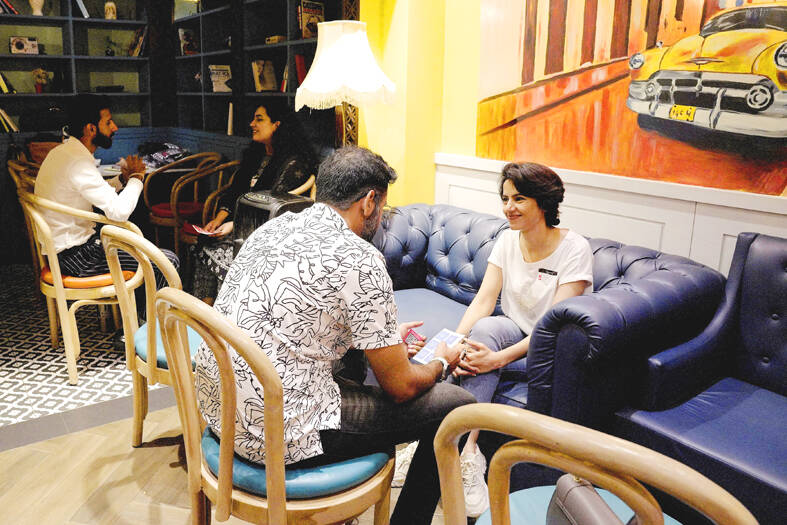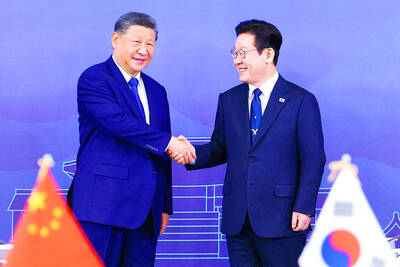Dozens of young singles gathered this month to meet potential marriage partners in Pakistan’s eastern city of Lahore, the first attempt by a UK-based matrimonial app to help people find spouses in person in the conservative Islamic country.
Typically, marriages in Pakistan are arranged by parents who look for suitable matches for their children from within their communities or the extended family. Dating apps are generally stigmatized and gender segregation socially and at work remains common in the country of 240 million people.
The Lahore event was organized by Muzz, formerly Muzzmatch, which said its app is based on Islamic etiquette.

Photo: Reuters
The app is restricted to Muslim users, and, in a nod to traditional values, gives the option of blurring pictures except for specific matches and allows for chaperones to oversee meetings.
Other smaller events are also emerging in the country to challenge traditional matchmaking norms.
Despite criticism online in the past for the app, the Muzz event was attended by about 100 people.
Aimen, a 31-year-old woman who did not want to be further identified, said she used the app on the recommendation of her US-based brother.
“I used the app for two weeks, but then I saw an ad for this event and thought, why not meet people in person?” she said.
Her mother would have accompanied her as a chaperone, but could not attend because of her health, she said.
Muzz, launched in 2015 in the Britain, which also has a sizeable Muslim population, has more than 1.5 million users in Pakistan, its second-largest market after Morocco.
Moaz, a 27-year-old man, said he has been using Muzz for a year and that he was hopeful of finding a wife through the app.
“I do get matches, but they have different priorities,” he said, adding that girls on the app expect him to involve his parents from the beginning.
“That is not [immediately] possible,” he said, stressing the need of getting to know someone before taking the next big step.
Annie’s Matchmaking Party, another Lahore event last week, used an algorithm to match 20 young professionals after a selection process and invited them to the meet.
Noor ul Ain Choudhary, the 30-year-old organizer, faced criticism online that her event promoted a “hookup culture.” She countered that it aimed to provide a safe space for singles to meet and connect.
“In Pakistan, we’ve had two options: biased arranged marriages or time-consuming dating apps with no guarantees. Safety during meetings is also a concern,” she said.
Abdullah Ahmed, 22, was bullish about in-person events and said he was convinced he may have found his perfect match at the Muzz gathering.
“The highlight was meeting an amazing girl,” he said, beaming with excitement, adding that they instantly clicked and swapped social media handles.
“We’re both Marvel fans. We’re already planning to catch the new Deadpool & Wolverine together,” he said.

‘CHILD PORNOGRAPHY’: The doll on Shein’s Web site measure about 80cm in height, and it was holding a teddy bear in a photo published by a daily newspaper France’s anti-fraud unit on Saturday said it had reported Asian e-commerce giant Shein (希音) for selling what it described as “sex dolls with a childlike appearance.” The French Directorate General for Competition, Consumer Affairs and Fraud Control (DGCCRF) said in a statement that the “description and categorization” of the items on Shein’s Web site “make it difficult to doubt the child pornography nature of the content.” Shortly after the statement, Shein announced that the dolls in question had been withdrawn from its platform and that it had launched an internal inquiry. On its Web site, Le Parisien daily published a

China’s Shenzhou-20 crewed spacecraft has delayed its return mission to Earth after the vessel was possibly hit by tiny bits of space debris, the country’s human spaceflight agency said yesterday, an unusual situation that could disrupt the operation of the country’s space station Tiangong. An impact analysis and risk assessment are underway, the China Manned Space Agency (CMSA) said in a statement, without providing a new schedule for the return mission, which was originally set to land in northern China yesterday. The delay highlights the danger to space travel posed by increasing amounts of debris, such as discarded launch vehicles or vessel

RUBBER STAMP? The latest legislative session was the most productive in the number of bills passed, but critics attributed it to a lack of dissenting voices On their last day at work, Hong Kong’s lawmakers — the first batch chosen under Beijing’s mantra of “patriots administering Hong Kong” — posed for group pictures, celebrating a job well done after four years of opposition-free politics. However, despite their smiles, about one-third of the Legislative Council will not seek another term in next month’s election, with the self-described non-establishment figure Tik Chi-yuen (狄志遠) being among those bowing out. “It used to be that [the legislature] had the benefit of free expression... Now it is more uniform. There are multiple voices, but they are not diverse enough,” Tik said, comparing it

RELATIONS: Cultural spats, such as China’s claims over the origins of kimchi, have soured public opinion in South Korea against Beijing over the past few years Chinese President Xi Jinping (習近平) yesterday met South Korean counterpart Lee Jae-myung, after taking center stage at an Asian summit in the wake of US President Donald Trump’s departure. The talks on the sidelines of the APEC gathering came the final day of Xi’s first trip to South Korea in more than a decade, and a day after his meeting with the Canadian prime minister that was a reset of the nations’ damaged ties. Trump had flown to South Korea for the summit, but promptly jetted home on Thursday after sealing a trade war pause with Xi, with the two